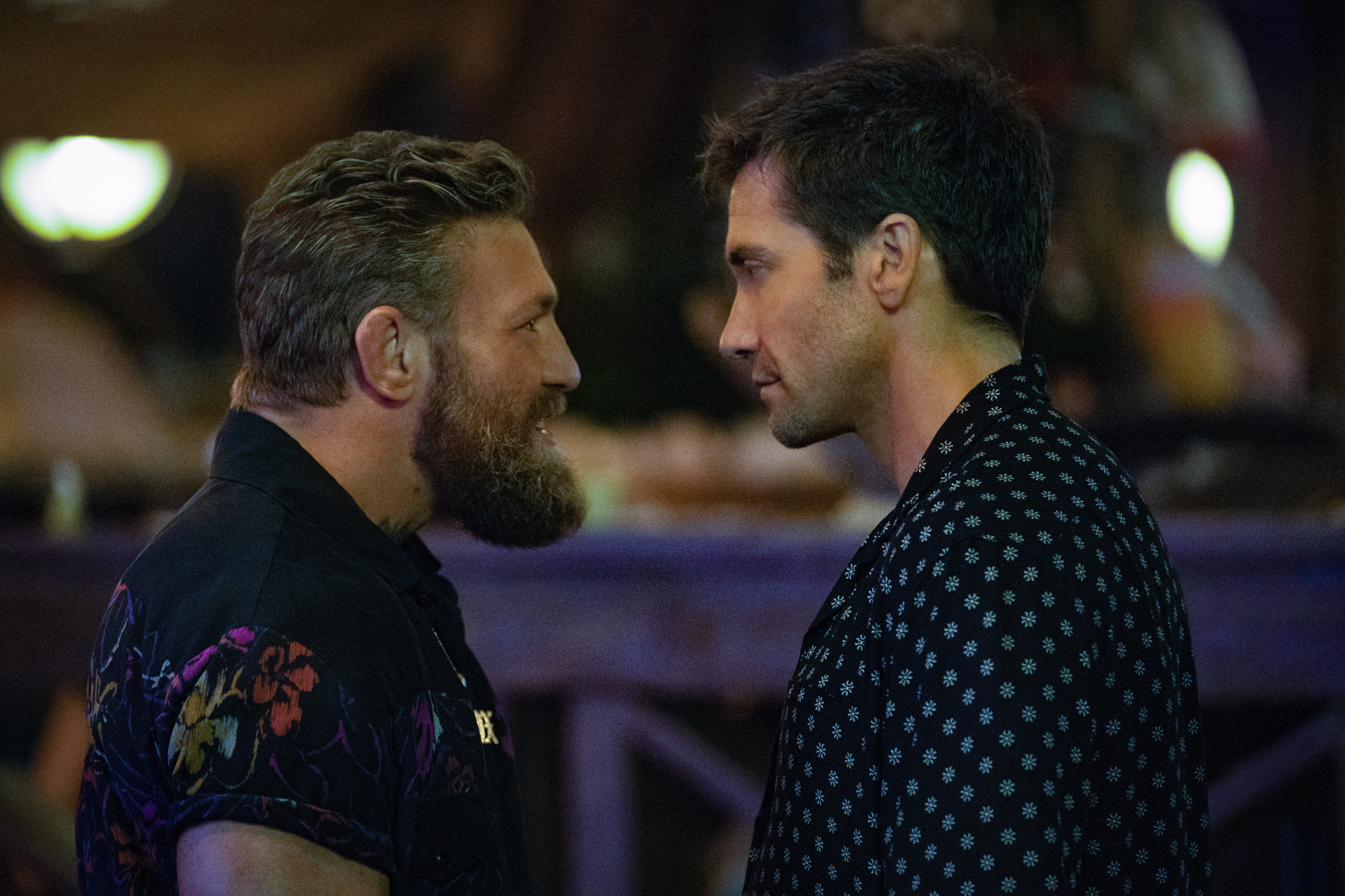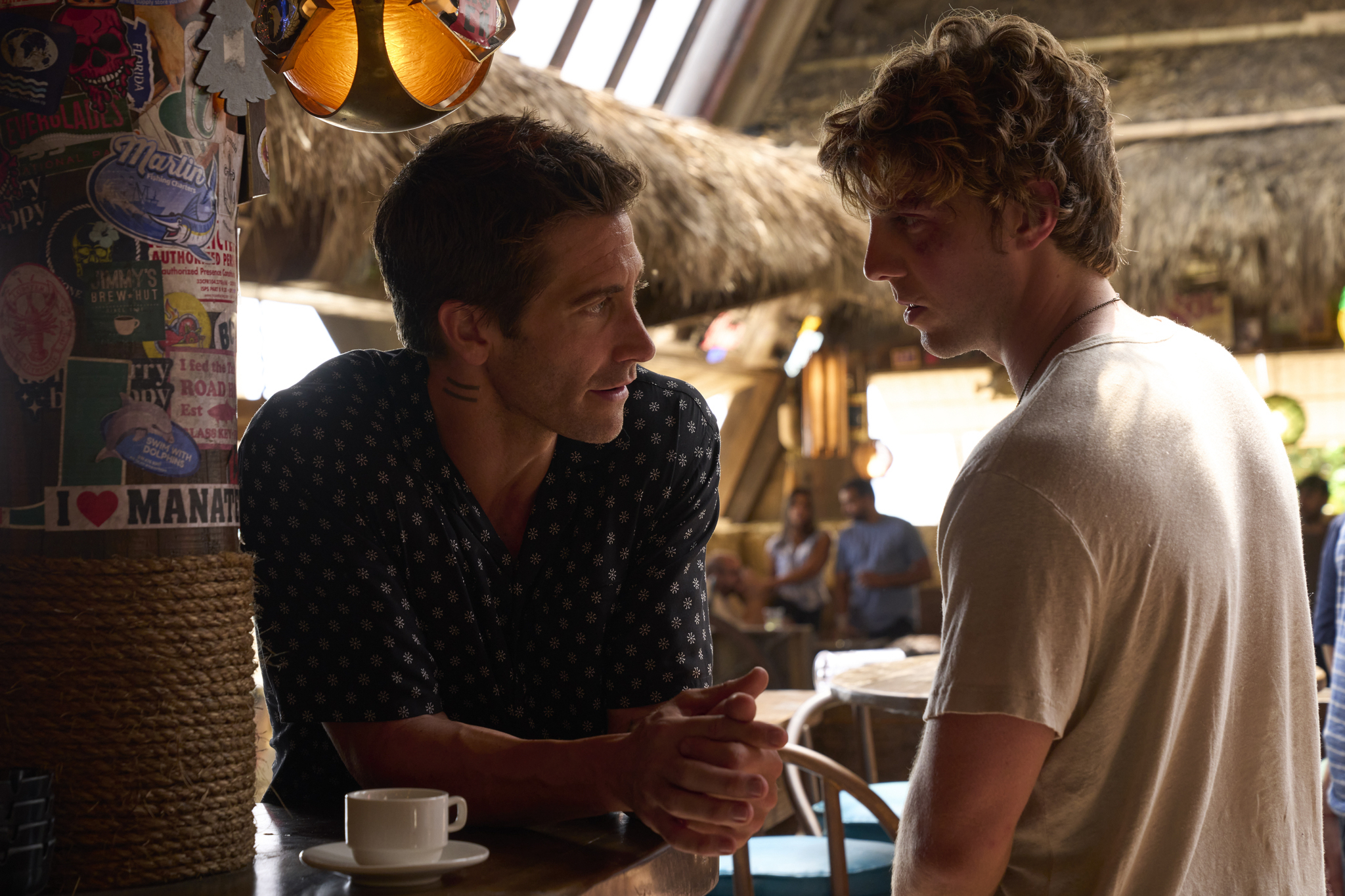
Disreputability is tragically undervalued in modern movies. Streaming has virtually erased the concept, and the allure, of the “straight-to-video” release. Cheap, sensationalistic films are still being made, but they’re more likely to be appreciated only by niche audiences. There’s no such thing as a mainstream B movie—made truly with just a few nickels and not backed by a cool, name-brand studio—that hungry moviegoers, en masse, will trek out to see. Cheap thrills have become so scarce that they now feel as rare as gold.
Road House, a loose but lively reimagining of the 1989 rough-and-tumble crowdpleaser, was produced by Amazon and will stream on Prime Video. You won’t have the chance to see it in a theater, a releasing strategy that has made its director, Doug Liman—who gave us the first Bourne Identity movie, as well as the 2005 Mr. & Mrs. Smith—extremely unhappy: he protested Amazon’s decision by boycotting the film’s premiere at SXSW. Liman is tilting at windmills, but he’s right. Road House plays just fine at home, but to see it in theaters, with a respectfully rowdy group of moviegoers, would have been a rare and perfect pleasure. This is a big, missed opportunity played out small.
Read More: How the New Road House Updates the Bizarre, Beer-Sluggin’ Best Bad Movie of All Time
Liman and his star, Jake Gyllenhaal, have given us a movie with drive-in spirit, vibrating with vigor and wit. Gyllenhaal plays scrappy UFC fighter-turned-bouncer Elwood Dalton, who’s not really anything like the character played by the great, effortlessly luminous Patrick Swayze in the 1989 version—yet Gyllenhaal’s interpretation works as a kind of tribute, a nod to the joy and vitality that seemed to animate Swayze’s every movement. Like Swayze’s Dalton, Gyllenhaal seeks to escape the memory of single murderous act. But a persuasive bar owner, Jessica Williams’ Frankie, lures him out of his sullen solitude. She needs someone to clean up the bar she’s inherited from an eccentric uncle, a lively joint in the Florida Keys that has suddenly attracted the wrong element. Dalton says no at first. He has other plans: in a half-hearted attempt at taking his own life, he eases his car into the path of an oncoming train, only to change his mind a split-second away from certain death. That's when he reconsiders Frankie's offer, showing up on the (fictitious) Glass Key with just one white wheelie suitcase—it’s comically small for his brawny frame—and a little tacklebox. Later, when Frankie gives him his first paycheck, in the form of an envelope full of cash, he opens that tacklebox and tucks the money inside. It’s his purse! This is the kind of genius character detail that will keep me watching movies forever and ever.

Frankie’s boisterous seaside establishment is called simply the Road House, a joke name that’s barely even a joke. Mostly, people go there to drink and have fun (and to listen to live music—the songs on the movie’s soundtrack range from zydeco to slinky R&B to bar-band raveups). But recently, a tough motorcycle gang has been causing trouble there. On his first night of employment Dalton takes them all on, one by one—breaking arms, butting foreheads, sending bodies flying with jujutsu twirls—and later drives them down the road to the hospital. There, Dalton begins falling for an ER doctor, Daniella Melchior’s Ellie, after she cynically “thanks” him for bringing a bunch of wounded yahoos to her hospital, which only increases her workload and that of her already exhausted staff. As she harangues him, his eyes practically take the form of little cartoon hearts. This is why you cast Jake Gyllenhaal in a Road House remake; the muscles are just the frosting.
It turns out the defeated motorcycle gang is working for spoiled rich kid Ben Brandt (played, with the perfect degree of smirkiness, by Billy Magnussen), the son of an incarcerated criminal, who seeks to obliterate Frankie’s bar for his own selfish purposes. That’s really all you need to know about the plot of Road House in advance, though you should brace yourself for the appearance of real-life UFC featherweight Conor McGregor, as a skull-cracker named Knox: he struts into the movie like a small refrigerator on a set of dainty-tough bowed legs. It’s one of the greatest screen entrances since Rita Hayworth flipped her hair in Gilda.
There are crazy boat chases in Road House, an explosion or two, and lots and lots of rambunctious fighting. Liman orchestrates it all with both precision and vitality—no wonder he’s bummed that people won’t be able to watch his movie, with other like-minded souls, in a movie theater. Gyllenhaal, too, would have been a smashing big-screen special effect. Now 43, he has lost some of the winsomeness he had as a young actor, in movies like Donnie Darko and Brokeback Mountain. But it’s been replaced by something else, maybe even something greater: he’s one of the most casually soulful actors we’ve got. In Road House, his timing is as dry as a sun-bleached pebble. When Ellie, after he’s deposited those thugs in her ER, calls him a “rage-filled dickhead,” he repeats the word dickhead as if it were the sweetest compliment—he’s almost dazed that this firecracker of a woman is paying him any mind at all.
Gyllenhaal’s face is more angular now, more chiseled. His features—the resolute jawline, those eyebrows like two thick slashes, that set of enormous anime-character eyes—haven’t slackened or softened. They’ve only become more definitive, more insistent. Gyllenhaal and Swayze were friends, and his performance here honors Swayze's without in any way parroting it, in a movie that’s a model of what a remake can be. The first Road House flopped in theaters, but found a now-legendary new life on cable and VHS. This new Road House appears at a time when so much of our entertainment has been shrunk down to a manageable size. Even on the small screen, may its unruly spirit prevail.
More Must-Reads From TIME
- The 100 Most Influential People of 2024
- Coco Gauff Is Playing for Herself Now
- Scenes From Pro-Palestinian Encampments Across U.S. Universities
- 6 Compliments That Land Every Time
- If You're Dating Right Now , You're Brave: Column
- The AI That Could Heal a Divided Internet
- Fallout Is a Brilliant Model for the Future of Video Game Adaptations
- Want Weekly Recs on What to Watch, Read, and More? Sign Up for Worth Your Time
Contact us at letters@time.com